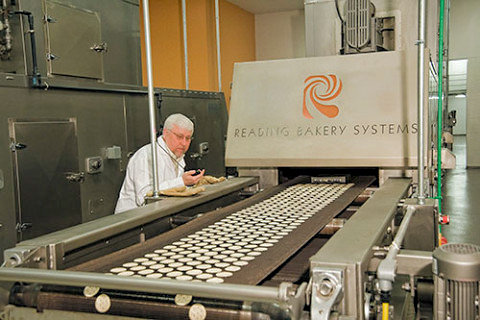Are you less than satisfied with the tool you are using to conduct bakery oven temperature profiling for FSMA compliance? The SCORPION® 2 from Reading Thermal enables you to monitor actual in-process conditions and get the critical information you need to correct problems and maintain optimum process control.
Reading Thermal, headquartered in Sinking Spring, Pennsylvania, has been focused on learning about the commercial baking process for more than 25 years. We have put that knowledge to use by manufacturing and supporting the SCORPION® 2 Profiling System which has become a standard in the baking industry and provides an easy way to validate your kill step for food safety.
Temperature and Food Safety Concerns
Controlling internal food temperature is crucial for achieving food safety. The FDA’s Food Safety Modernization Act (FSMA) requires commercial bakeries to provide validation of process controls, such as thermal kill steps, in order to reduce food borne pathogens, such as Salmonella spp., in ingredients and finished products.
Oven temperature causes physical and chemical reactions in dough/batter. Temperatures that are too low or too high during baking can lead to changes in fermentation and humidity levels, as well as undesirable changes in color, texture and taste.
Internal food temperatures also impact food borne pathogens, and scientific proof is the only way to confirm that your baking process consistently delivers the desired lethal result to ensure the destruction of pathogenic microorganisms.
Inaccurate ovens are common. Some struggle to get up to the right temperature while others overshoot the temperature you set. If the temperature is too cool or too hot or fluctuates often during baking, you may experience disappointing, and potentially lethal, results.
The SCORPION® 2 Temperature Sensor Array measures temperature at product level, in fixed positions across the conveyor, and delivers a true representation of what your product is experiencing over time. Different types of pluggable sensors are available, including one designed for solid or tight mesh conveyors and one for open mesh conveyors.
Other Important Measurements
Humidity: Products passing through a thermal process interact with the moisture in the environment. This can affect finished product quality; e.g., reducing moisture evaporation during cookie baking can keep their surfaces moist and prevent cracking. The SCORPION® 2 Humidity Sensor measures the absolute moisture content of the thermal environment in both your heating and cooling processes.
Air velocity: Oven air velocity is the measurement of airflow inside the oven. Along with other parameters, air velocity influences the coloration, texture, firmness, and baking time of your final product. Oven air velocity can be measured and recorded with the SCORPION® 2 Air Velocity Sensor.
Heat flux: Oven heat flux is the best indicator of oven performance during baking in terms of the product. Many bakers study oven heat flux profiles when trying to produce the same product on two different lines or when trying to transfer product from one line to another. The SCORPION® 2 Heat Flux Sensor is designed to measure convective and radiant heat fluxes at product level.
To bake your products to perfection, it’s important to know what is happening inside your bakery oven. The innovative SCORPION® 2 Data Logger from Reading Thermal helps you with temperature profiling to achieve compliance with FSMA requirements. Contact us online, or call us at (610) 678-5890 Ext. 2 to learn more about our innovative products.

